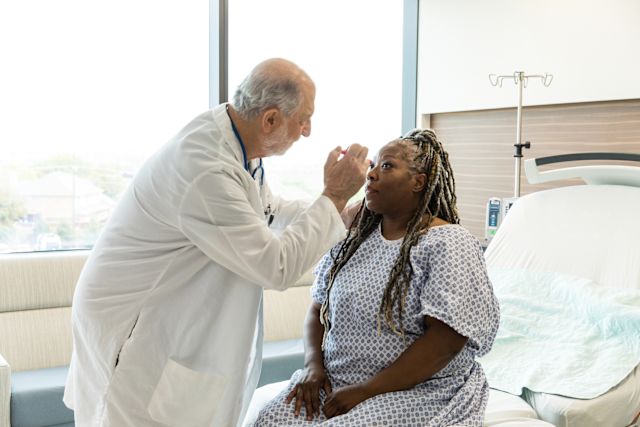You’ll know if you have a concussion, right? Don’t be so sure, says Scott Scherr, MD, an emergency physician with Southern Hills Hospital in Las Vegas.
“A lot of concussion symptoms are very subtle,” explains Dr. Scherr, and people may not make the connection between the symptoms and the injury. Here’s what to look out for after you’ve received a blow or bump to the head, no matter how big or small.
Concussions and your brain
“’Concussion’ is another term for a mild traumatic brain injury (TBI),” says Scherr. “Anything can cause a concussion, from a minor to a major blow to the head.” A concussion is actually two parts: the initial hit, and then the brain shifting inside the skull. That stretches and damages the brain cells and could disrupt the connections between them.
How concussions happen
Age is a factor in who’s at greatest risk for suffering a concussion, according to Scherr. “Car accidents are generally the most common causes of concussions,” he says. “In very young populations you see a lot of falls. Once kids start doing sports, concussions tend to be sport-related. For elderly patients you start seeing falls again.”
At least if you’re in a car accident or have a bad fall you’ll know if you have a concussion, right? Not necessarily. Symptoms may start right away, or days or even weeks after an injury. Delayed symptoms might make it difficult to connect your injury with the symptoms you’re now experiencing. “Some people complain of mild dizziness, nausea, or vomiting and just blow it off,” Scherr adds.
Concussion symptoms
“The first thing we look for when someone sustains a blow to the head is cognitive impairment,” Scherr says. “Short term memory loss, when someone can’t remember the injury or what happened before it, is common.”
Other common symptoms include:
- Headache
- Neck pain
- Nausea
- Dizziness
- Fatigue
- Feeling dazed
Depression, anxiety, loss of appetite, and problems sleeping may appear after a concussion.
See a healthcare provider within one or two days of a suspected head injury, and immediately if you experience any of these more serious symptoms:
- Seizures
- Drowsiness or inability to wake up
- Confusion
- Slurred speech
- Loss of consciousness
- Headache, nausea or vomiting that does not go away
Concussion myths
Getting a concussion is not like the movies, where the good guy karate chops the bad guy in the head and the bad guy jumps up good as new a few hours later. In real life, if someone loses consciousness for more than 30 seconds they should be checked out in an emergency room.
It’s commonly said that you should never fall asleep after a concussion or you’re likely to slip into a coma or die. That myth probably stems from misunderstanding the lucid interval, where someone with brain bleeding wakes up from unconsciousness and seems fine, but they soon slip into a coma. Instead of keeping someone who has had a concussion awake, let the person sleep but wake them up every few hours to make sure they wake up easily and their condition isn’t getting worse.
Treatment for concussions
Symptoms of mild TBIs should go away on their own. But Scherr says there’s no standard length of time for symptoms to stick around. “It could be days to weeks to months,” he says. “It depends on how severe the injury is and how your body reacts.”
The most important thing you can do after a concussion is rest. Rest helps the brain heal. Other recovery tips include:
- Get plenty of sleep at night.
- Avoid activities that are physically or mentally demanding.
- Return to normal activities gradually and only with your healthcare provider’s say-so.
- Avoid alcohol and drugs.
- Try not to multitask, in order to rest your brain.
- Try to avoid computers and screens as much as you can, in order to rest your brain. Light may also trigger certain symptoms.
Final words of advice? “Once you get a concussion you want to do what you can in order to prevent a second concussion,” says Scherr. “On a cellular level, once a concussion happens you get a lot of changes in the brain. With a second concussion, there’s even more changes, and you may start to become more sensitive to traumatic brain injuries.”






